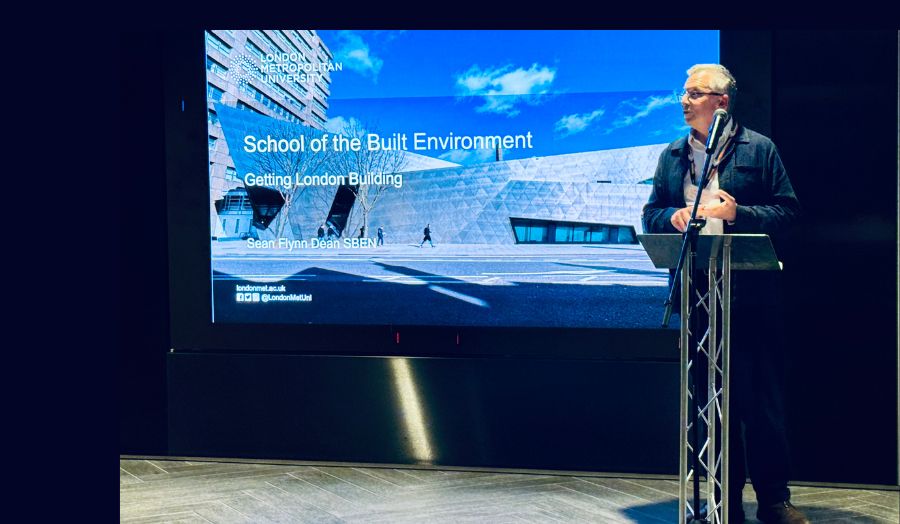Apply for this course
Please select when you would like to start:
If you're a UK applicant wanting to study full-time starting in September, you must apply via UCAS unless otherwise specified. If you're an international applicant wanting to study full-time, you can choose to apply via UCAS or directly to the University.
If you're applying for part-time study, you should apply directly to the University. If you require a Student visa, please be aware that you will not be able to study as a part-time student at undergraduate level.
Why study this course?
If you’re looking for a highly rewarding career, with excellent job prospects, then look no further than our Real Estate BSc. London Met’s School of the Built Environment have designed this course to equip you with the skills and knowledge to become a competent and valued real estate professional.
On this programme, you’ll become an expert in the field, studying all things property, from law and economics to valuation and planning. You’ll be able to advise on the development of commercial real estate and property investments, in both the private and public sector. By drawing on your business insights, technical skills and critical thinking, you’ll expand your knowledge of both traditional and contemporary commercial surveying practices.
Our Real Estate BSc is taught by top academics, industry experts and practitioners. We have strong links with a range of employers within the built environment industry, who play a key role in our curriculum design, as well as in other London Met career and guidance services.
Throughout your studies, you’ll participate in authentic learning activities and assessments, while gaining invaluable experience through studying real-life projects. You’ll have the opportunity to get familiar with industry standard equipment and software, accelerating your job prospects and earning potential to the next level.
Discover the opportunities, challenges and enjoyment that this course has to offer as you grow into a next generation science, technology, engineering, and mathematics (STEM) professional.
What's more, our vibrant and cultural Holloway campus is just a stone’s throw away from the City and West End.
Study in the nerve centre of the UK's real estate industry
Our location in London provides us with unparalleled access to some of the UK's most influential real estate organisations, multidisciplinary consultancies, developers, contractors and industry professional bodies
Enrich your studies from outside the classroom
You’ll have the opportunity to engage with external organisations and projects, take part in site visits, attend guest lectures and engage with real estate surveyors, developers and consultancies
Benefit from a curriculum built with your career in mind
This course is taught by top academics, industry experts and practitioners, and we have strong links with a range of employers within the built environment industry, who play a key role in our curriculum design
Course modules
The modules listed below are for the academic year 2024/25 and represent the course modules at this time. Modules and module details (including, but not limited to, location and time) are subject to change over time.
Year* 1 modules
Year 2 modules
Year 3 modules
Built Environment Principles
This module currently runs:all year (September start) - Tuesday morning
(core, 30 credits)
In this module you will learn about the key principles that underpin the built environment. You will be introduced to the stakeholders who have an involvement in the built environment and the building process including, construction professionals, landowners, government, local authorities, investors, developers, and the public. You will explore their roles and responsibilities and how they impact on construction projects and the wider built environment.
You will develop an understanding of the design, planning, financing, construction, sale and operation of organisations, products, buildings, infrastructure, and places within which people live, work and travel.
You will learn to use techniques such as PESTLE to help you analyse the wider context, taking into account Political, Economic, Sociological, Technological, Legal and Environmental factors that will have an influence on your work, both nationally and globally.
You will look at everything through the lens of sustainability, and equality, diversity, and inclusion (EDI) which is essential if you are to become a professional and ethical practitioner.
The module involves the creation of a Professional Development Journal (PDJ) which students reflect on their learning in and outside the classroom. The PDJ is an iterative journal, developed over each year of students’ studies through levels 4, 5 and 6, and is assessed at each level. Students will be supported in learning about reflection, the software used for the PDJ and there will be opportunities for formative feedback and class discussion throughout the module.
By the end of this module, you will have a clear understanding of the key factors at play in the Built Environment. You will also have developed valuable research and critical thinking skills and acquired a greater understanding of the industry to help with your future career planning. You will start your journey towards becoming a built environment professional by becoming a student member of an appropriate professional body.
Read full detailsConstruction Technology and Building Services
This module currently runs:all year (September start) - Thursday afternoon
all year (September start) - Thursday morning
(core, 30 credits)
Professionals in the built environment need to have expert knowledge and understanding of construction technology and building services, and their contribution towards a sustainable built environment. This module introduces you to both traditional and modern construction technology used in residential and low-rise construction. It will explore how they are being used to lessen the environmental impact of construction projects and building operation. You will learn about how services are incorporated into construction projects in a sustainable way, including water, heating, drainage, energy and data.
Throughout the module, you will learn the role of statutory government regulation in construction and the importance of health & safety for the workforce during the construction phase, and the occupants once the building is handed over.
By the end of this module, you will have a clear understanding of a variety of construction technologies and building services and an appreciation of their contribution towards a sustainable built environment. You will have developed valuable technical, research and critical thinking skills including an understanding of how to interpret drawings which communicate construction information to professionals and skilled tradespersons.
Read full detailsReal Estate Economics and Valuation
This module currently runs:all year (September start) - Tuesday afternoon
(core, 30 credits)
This module will introduce you to real estate economics and valuation, and their relationship to the wider economy and property market. Upon completion of this module, you will understand the notions of supply and demand, the problem of the inelasticity of supply with real estate, and develop the ability to apply economic principles in your analysis of the property market and undertake basic valuations. Valuation is a specialist part of applied economics and is an essential foundation for aspiring Chartered Surveyors specialising in the Real Estate market.
This module will provide you with the fundamental knowledge necessary for decision making when advising on real estate development, investment, and valuation, both under RICS Global Standards (Red Book) and outside these standards. Robust and trustworthy valuations are essential for the efficient running of the economy, and financial lenders must have confidence in them.
The valuation section of this module primarily focusses on the valuation techniques used to assess the value of commercial real estate. You will apply your acquired knowledge to various situations, learning how to analyse scenarios, extract relevant facts, and make appropriate assumptions in order to complete your valuations. This will develop your critical analysis powers and numeracy skills.
Read full detailsReal Estate Law and Planning
This module currently runs:spring semester - Thursday
(core, 30 credits)
The module will introduce students to law and planning in the context of real estate and the built environment.
Activities in real estate are bound by the law and as such, real estate professionals need to understand the legal environment in which they operate. This module introduces students to the fundamentals of English law and core legal topics relating to the built environment. The module examines English common law, the law of tort and the law of contract. Students will learn about the ownership of land and landlord and tenant law and examine public law and regulation, and law as a mechanism for social change. You will explore the law and its role in promoting sustainability and addressing climate change.
Town and country planning is about managing the demand and the use for land. Planning is an essential component of the development process contributing towards protection for the environment and communities, placemaking, and encouraging regeneration. UK planning policy is supported by legislation, in the form of Acts of Parliament and Statutory Instruments and planning policy is developed at national and local levels. The focus of the policy is on affordable housing, addressing climate change, economic growth and levelling up, and health and wellbeing. Planning can be a contentious matter with a balance between the different priorities difficult to achieve. This module will take students through the planning legislation and policy at national level and look at the relevance of local plans and a plan driven system. You will then consider recent and proposed changes to the planning system and the efficacy of these. The module and its assessment encourage student inquiry and reflection in considering the environment around them in relation to planning policy and controls, and to critically investigate this, particularly in relation to sustainability.
Accounting for Real Estate
This module currently runs:spring semester - Wednesday afternoon
(core, 15 credits)
This module introduces students to financial accounting and reporting. Accounting is a means by which a company presents its accounts and reporting allows stakeholders to evaluate the financial position of a company. Standard reporting mechanisms enable comparisons to be made between the financial health of companies.
The module will look at accounting as it impacts on business and economic activity, with an emphasis on real estate organisations. You will develop skills which are useful in the study of real estate and also to develop your wider business, management and employability skills. The module examines corporate structures, basic financial statements and the principles and concepts underpinning corporate financial reporting. Understanding and analysis of financial data is essential for valuation and investment purposes and the skills learned in this module will be developed further in the next level of study.
Applied Valuation
This module currently runs:autumn semester - Thursday morning
(core, 15 credits)
Valuation is an essential skill for Commercial Real Estate professionals. This module builds upon your learning from Level 4 and develops your skills further as you will examine traditional methods of valuation in more detail together with contemporary models such as discounted cashflow. You will examine some of the characteristics and risks to be considered in valuation and their applicability depending on the nature of the valuation. You will consolidate your learning of the importance of market data and how your valuation must be grounded in market evidence. Throughout the module you will understand the importance of following professional standards together with ethical behaviour.
Read full detailsBuilding Pathology and Refurbishment
This module currently runs:autumn semester - Wednesday afternoon
(core, 15 credits)
In this module you will focus on studying the interpretation, conservation and restoration of the built environment in the UK and around the globe.
Through studying building pathology, you will gain an understanding of common and more unique building defects, the root causes of them and solutions available to remedy them. Identifying reasons for failure is one which requires you to have an enquiring mind and voyage on a journey of discovery, through which you will gain an understanding of the building fabric, its services, its users, and the wider environs, all which can impact positively or negatively on a building's preservation. This holistic approach can include gathering historical information regarding the building, undertaking detailed inspections, including intrusive investigations, and observing the building occupants' interactions with the building fabric and services. Building pathology is a combination of science, surveying and technology and will draw upon your knowledge, creativity, and problem-solving skills.
In addition to pathology, you will study the allied subject area of building refurbishment, covering restoration, adaption, and retrofitting. When a building has outlived its usefulness, an option often chosen is to demolish it and rebuild something new in its place. However, we are recognising that when we demolish, the carbon which was generated during its original construction, something we term as being embedded into the original building, is replaced by even more carbon generated in connection with the new building’s materials, manufacturing, and construction. Refurbishing and adapting buildings are the sustainable ways to meet new needs. This can include retrofitting energy efficiency measures, from the very simple options to grand schemes. Furthermore, in terms of sustainability in its wider sense, retaining the heritage of our built environment is important for the character of an area and preserving heritage value for future generations. There is a need to have an understanding as to when demolition is not the answer and refurbishment and/or repurposing an existing building is the right thing to do. This module will equip you with the knowledge and skills to be able to advise on appropriate building technology solutions to upgrade and/or repurpose a building.
Upon successful completion of this module, you will be able to:
• Identify and appraise a wide range of building types and their elemental parts
• Undertake simple condition surveys of buildings
• Prepare an evidence base of an existing building upon which decisions can be made as to how to remedy defects found
• Assess the impact of occupational behaviours on a budling's performance and condition
• Understand means by which you can identify deleterious materials, the implications to the building and people of such materials and managing their removal where required
• Appraise various conservation techniques on modern and historical built environment assets
• Appraise the similarities and differences between refurbishment, restoration and retrofitting
• Assess the various factors causing building obsolescence and mitigation against demolition of such buildings
Real Estate Asset Management
This module currently runs:spring semester - Thursday afternoon
(core, 15 credits)
This module looks at how real estate surveyors optimise the value of real estate assets by proactive property management and effective asset management. The first part of the module considers the management of commercial property, the landlord and tenant relationship, and the obligations of both, with a view to maximising returns through active management. Topics covered include lease terms, service charges, maintenance regimes and sustainability, including environmental reporting. The second part of the module looks at the asset management of commercial property from an investment point of view, to maximise financial returns. This relates to lease restructuring, value, refurbishment programmes, obsolescence and potential development opportunities. You will learn about the technology available to manage data to understand how buildings are used and the importance of a dynamic management strategy identifying risks and future trends, to retain asset values.
Read full detailsReal Estate Development
This module currently runs:all year (September start) - Wednesday morning
(core, 30 credits)
The development of land for real estate is an exciting, challenging area of work, with each development being unique and the process difficult to transfer from one development to another. It is an area which is highly regulated, including in terms of planning, financing, environment, health and safety and the building control process.
This module introduces you to the process of development and its commercial drivers. It covers the appraisal of developing land for real estate, considering the risks and returns, particularly relating to regulations, finance and funding. You will learn where to find data to help in this appraisal and how to interpret the data.
The module builds on knowledge you have already gained around planning, development and economics, bringing this together to consider the factors in an authentic development project which influence a successful financial outcome. In considering the feasibility of a development you will also examine the construction phase, completion of the build and asset management.
Throughout the module, social value and environmental impact will be considered in relation to the development of real estate. Learning will be developed through real life case studies, inside and outside the classroom.
Urban Regeneration
This module currently runs:all year (September start) - Thursday morning
(core, 30 credits)
This module brings together some of the skills already developed in the course, particularly in relation to planning and economics, and takes a more holistic look at the influence of these and other factors on urban regeneration. Students examine the many drivers of urban regeneration, looking at different examples from the UK and around the world. Students will consider the master planning process and the meaning of placemaking and appreciate the need for community engagement for successful schemes. The module will help students to better understand the practical steps involved in regeneration but also the wider social and economic implications of such regeneration.
The module draws on students’ own experiences and interests and allows them to explore this fascinating theme of urban regeneration in detail, examining the critical arguments and encouraging the use of multiple credible sources in devising these arguments.
This module runs alongside and compliments ‘Real Estate Development’ allowing students to appreciate the differences between short term, profit driven development and much broader and strategic urban regeneration.
Advanced Valuation
(core, 15 credits)This module builds on previous learning around the principles of valuation and valuation methods, extending critical understanding of the role of the valuer, the valuation process and professional conduct. It will enable you to apply valuation theory to current problems and challenges in the commercial property market, including emerging investment asset classes and sustainability.
The module applies valuation principles to more complex situations and introduces discounted cash flow techniques and specialist valuation processes. It considers the application of RICS regulations in valuation work, including professional negligence and duty of care. You will be given the opportunity to apply your valuation skills to a variety of different situations.
The role of the valuer in the context of sustainability and commercial benefit of sustainability will be examined throughout the module, linking with other modules at this level of study.
As is required of any real estate professional, you will be expected to keep up to date with current issues and analyse current economic data to appreciate the effect on real estate valuations.
Applied Research Project
This module currently runs:all year (September start) - Wednesday morning
(core, 30 credits)
The module will provide you with the opportunity to undertake an in-depth study of a subject which is of personal and subject interest in the field of the built environment. You may focus your research upon a topic or challenge relevant to your current programme of study and based upon an academic subject of interest, your current work practice or recent work experience or placement. The submission will take the form of a dissertation.
You are encouraged to develop your critical thinking and undertake theoretically informed research. The module will develop your understanding of the linkages between conceptual issues, subject area, and research methods.
The module will introduce you to research methods and strategies which are appropriate to your chosen area of study. It will provide you with experience in the planning and implementation of a research project and the subsequent writing up of research findings in a dissertation.
You will be introduced to this module before the end of the level 5 academic year. This introduction will take the form of a briefing session to enable you to begin the process of considering potential areas of study ahead of the next academic year.
Read full detailsBig Data and the Built Environment
This module currently runs:spring semester - Friday afternoon
(core, 15 credits)
This module focusses on the methods and techniques of using Big Data in business with a specific focus on organisations operating within the built environment. Given the increase in available Big Data, organisations are aware of the need to effectively utilise Big Data to gain competitive advantage. In this module, you will explore means by which organisations can benefit from Big Data.
You will appraise the technologies available to organisations and means to deploy them to aid the decision-making process. Using data analytics and data visualisation tools you will prepare and present solutions to scenario-based problems.
By the end of the module, you should be able to demonstrate a deep knowledge and understanding of:
• The business opportunity and value creation possible through the utilisation of Big Data and business analytics
• How to appraise and select appropriate approaches to Big Data technologies and business analytics
• How to achieve business advantage through the analysis of Big Data
• Means to present Big Data to a variety of audiences using visualisation tools
Commercial Real Estate Practice
(core, 30 credits)This module draws on students’ prior learning of economics, valuations, planning and development, asset management and finance and accounting, bringing the knowledge together to consider property as an investment, investment risks and returns, how investment is financed and various financial models. You will compare property against other investment classes and appreciate the nature of property investors and the role of institutional investors in the market. You will then apply this learning to the techniques of investment appraisal, learning how to evaluate performance, risks and returns. The knowledge will be applied to different property types, including multi-asset portfolios.
As well as UK markets, you will examine global property markets and reflect upon global financial events which have influenced or been influenced by real estate investment.
Throughout the module sustainable investment and finance will be considered. Future trends and the influence of big data and proptech will form part of the module debate. You will be required to contribute to discussion from your own experience, research and keeping abreast of current economic issues and performance of financial markets. The module will enable you to develop strong analytical skills to apply to practical industry scenarios and to critically evaluate the investment performance of property assets. These are valuable skills which will be of benefit to your career and are competencies required for professional body membership.
Sustainable Real Estate
(core, 15 credits)Societal demands in response to climate change and social injustices are forcing real estate investors, owners and occupiers to become increasingly accountable for the impact of their decisions not only on the environment but on people and communities as well. ESG (environmental, social and governance) initiatives are the response to these concerns. Responsible development, investment and management of real estate are at the core of these initiatives, affecting all aspects of real estate and influencing business decisions.
Reporting metrics and regulation are evolving to meet stakeholder demands to improve climate stewardship, social value and ethical governance across the real estate sector and you will examine reporting mechanisms, along with looking at a broad base of examples from around the world. Throughout the module you will be expected to critically examine sustainability at all stages of the property lifecycle, in relation to ownership, development and investment in property; from government and shareholders to supply chains and local communities.
Development, Finance and Risk
This module currently runs:spring semester - Friday morning
(option, 15 credits)
The module aims to develop your critical awareness of the process of development within the built environment. It will require you to produce an appraisal of a proposed development site, providing advice to your client regarding the proposals. You will need to consider the variables which could impact on the success of the development and provide reasoned advice on things such as the legal position, financing options, sustainability of the development and an assessment of the risks present.
This module explores the development process in detail, including site identification and acquisition, assessing the development potential of the site, calculating the development profit of differing scenarios, looking at different funding models, arriving at a market value of the development considering current and anticipated market conditions and planning conditions. A valuation of the development will be undertaken following best practice which is to use 2 recognised methods to allow for cross checking of the outcomes.
The development process is a creative one and you will have the opportunity to consider and explore a variety of options when appraising the development potential of a site. Factors you will need to consider include things such as permissible land uses, allowable density of development, site topography and other development factors such as social value, availability of services, infrastructure and ground conditions. Client objectives will also need to be accommodated and these could include timescales, environmental and sustainability goals, cashflow, phasing of developments and target profits or yields.
Read full detailsInclusive Teamwork and Leadership
This module currently runs:spring semester - Wednesday afternoon
(option, 15 credits)
The module aims to develop your critical awareness of the people dimension of teamwork and leadership. It will look at the role soft skills play in the successful leading and managing of a team and individuals, and how these can help you build and maintain a successful and focussed project team. It will address how to distinguish between different types of change projects and propose techniques in leading teams to achieve success.
Assessment choice is available, including the option to undertake the role of a Peer Assisted Learning Coach, providing support to a level 4 or 5 student over a period within the semester.
The knowledge gained will enable the student to develop strategies to form and maintain integrated project teams.
By the end of the module, you should be able to demonstrate a deep knowledge and understanding of:
• soft and hard skills
• soft skills in teamwork and leadership
• stakeholder management
• team selection
• change management
• building inclusive teams
• the role of corporate social responsibility in the built environment
• managing conflict
Professional Placement in the Built Environment
(option, 15 credits)The aim of this module is to provide you with an opportunity to display a high degree of autonomy through the management and production of a piece of workplace informed individual coursework at level 6 of your undergraduate studies. The module provides you with the opportunity to apply your academic knowledge and skills within a workplace setting. This type of experience is valuable and will allow you to experience the reality of the workplace and enhance your employability skills. The experience will also provide a rich source of material for your Professional Development Journal (PDJ).
There are several scenarios which will constitute a professional placement, and for the purpose of this module we welcome a broad range of work-placement types. However, a pre-requisite is that it is within the Built Environment sector and approved at module level by the module team, and by the University Work-Based Learning Team (further details can be found at the bottom of this section).
The period of professional placement work you need to undertake for the purpose of the module is 15 days (3 weeks), full time equivalent. However, this period of work does not have to be taken in a discrete block. The work-placement activity needs to take place during the period between week 1 of your Level 5 Summer Semester and week 4 of your Level 6 Spring Semester. This is to give you sufficient time to prepare your coursework submissions once your work-placement is completed. Exact dates will be issued to you in advance.
By the end of the module, you should be able to demonstrate a deep knowledge and understanding of:
• How to effectively express and apply your current skills and abilities in relation to your career values and goals.
• Ways to practically apply the knowledge you have gained through your course programme in a relevant workplace environment.
• The dynamic workplace environment and practices relevant to your chosen area of study and professional practice
• How to contribute towards making the workplace an efficient, effective, and inclusive environment
• The pathway towards achieving your personal and professional development goals
Please note:
● Students will be contacted prior to the semester to provide support in securing a work-based placement in good time.
● Students are responsible for applying for opportunities and to engage with the Module Team/Work Based Learning teams to assist them.
● The suitability of any opportunities will be assessed by the Module Team/Work Based Learning Team and all placements must meet Health and Safety requirements for Higher Education Work Placements.
● Those studying on a Student Visa will only be able to complete a work placement if it meets UKVI monitoring requirements including: approval of the placement dates and hours by the Placement Officer prior to starting the placement, submission of weekly timesheets for the hours undertaken, signed by their line manager/supervisor and continued engagement with the Placement Officer as well as the International Student Support and Compliance Team.



















.png)



